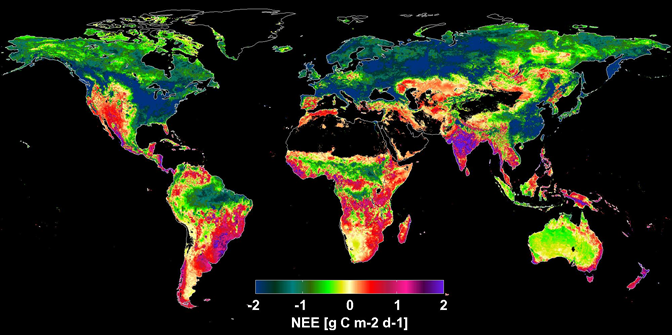BIOS 534
Integrated Systems Ecology
BIOS 534
Spring semester (3 CR)
Professor: John S. Kimball
Textbook: Forest Ecosystems: Analysis at Multiple Scales (2007), by R.H. Waring and S.W. Running

Summary:
Computer modeling is an effective tool for studying ecological systems because one can never measure all relevant functions of a complex system. Computational modeling provides an efficient mechanism for hypothesis testing and extrapolation of ecological predictions that extend well beyond the limits of sparse observations. Satellite remote sensing is an important component of the ecosystem modeling framework because it provides spatially continuous observations of landscape conditions that can be used as both model drivers and validation.
Students in this course will explore general principles, applications, strengths and limitations of ecosystem modeling. Systems modeling elements investigated will include: analyzing the entire system holistically; identifying connections and causality; organizing and prioritizing data collections; generalizing beyond an individual study site; investigating manipulations and perturbations, and predicting system behavior in context with underlying model uncertainty. Students will also investigate major steps in model development, including: identifying a science question; developing model objectives to address the question; developing a conceptual model; determining mathematical equations representing key processes; computer implementation; model calibration and validation; and drawing conclusions from the model results. A desired learning outcome is for each student to have the ability to analyze any new ecosystem model they might encounter for stated purpose, key assumptions, structural organization, and range of applicability. Students will also explore and evaluate different remote sensing products and applications related to ecosystem modeling. By the end of the course each student should be able to critically evaluate and identify appropriate models, remote sensing applications, and data sources relevant to their individual research areas.
This course includes lectures and topical discussions on ecological modeling principles and major elements of vegetation ecophysiology; water, carbon, nutrient and energy cycles; and remote sensing applications. Students engage in leading oral and written presentations, and class discussions on different ecosystem models relevant to their own research. Different models are evaluated and compared in relation to their conceptual basis, appropriate uses, key assumptions, input requirements, strengths and limitations. Student classwork responsibilities and grading are based on active student participation in class discussions, oral presentations and written reports. Students will give an initial oral presentation summarizing a model of their choice, including conceptual basis, appropriate uses, key assumptions, strengths and limitations. Students will then give a more detailed oral presentation and written report on another model of their choosing, including detailed discussion of model scope
